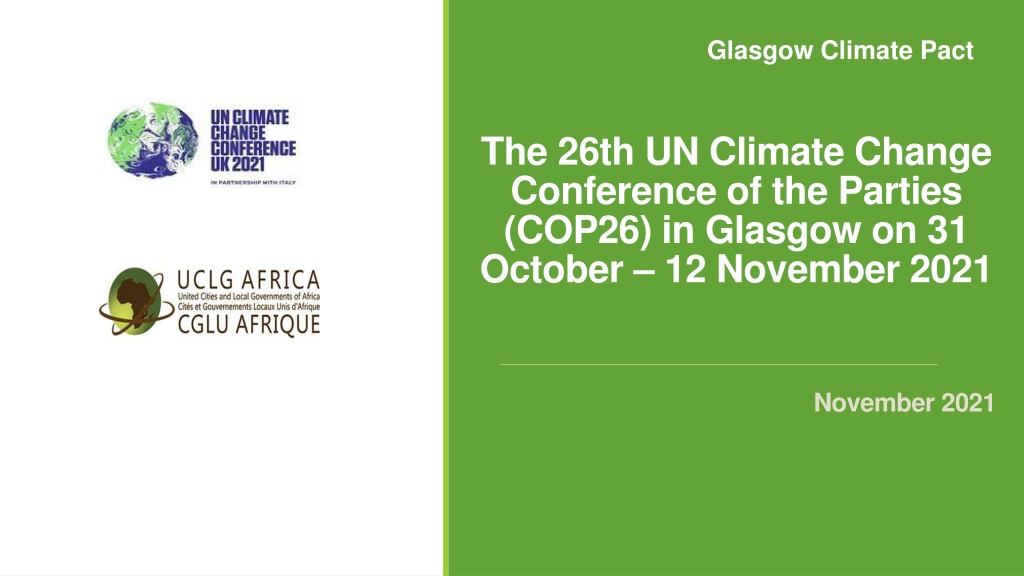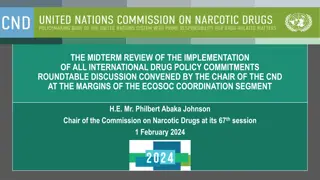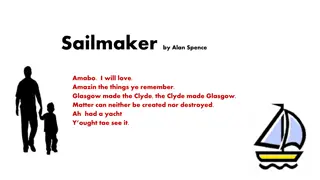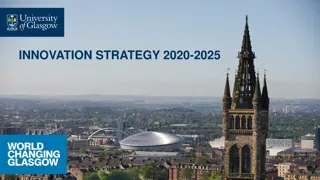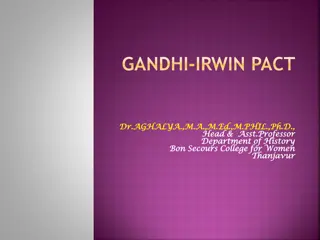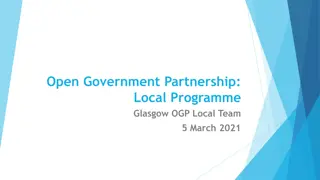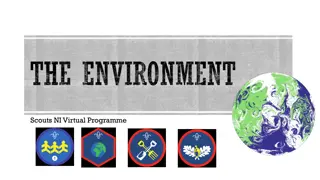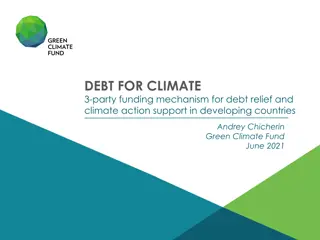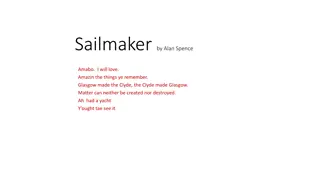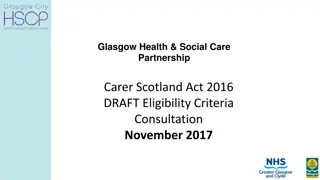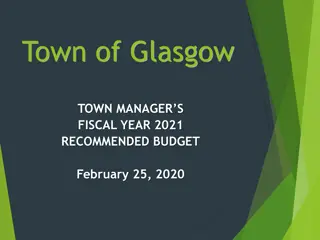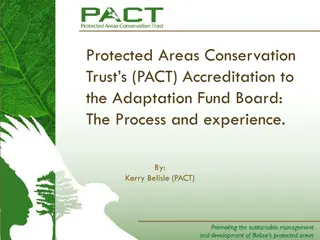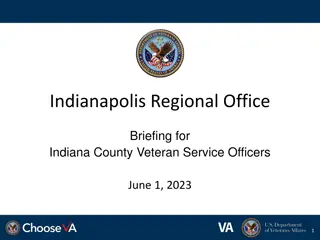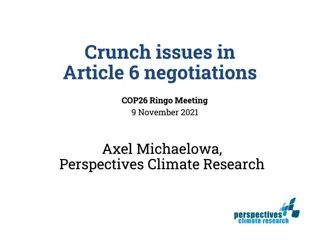Based on the provided content, here are the requested items: Glasgow Climate Pact COP26: Key Outcomes and Commitments
The Glasgow Climate Pact from COP26 highlights the urgency of addressing climate change, emphasizing the need for reducing emissions, enhancing adaptive capacity, and promoting sustainable development. Parties are urged to align contributions with low-emission strategies, accelerate technology deployment, phase out inefficient fossil fuel subsidies, and support developing countries in climate action and capacity building.
Download Presentation

Please find below an Image/Link to download the presentation.
The content on the website is provided AS IS for your information and personal use only. It may not be sold, licensed, or shared on other websites without obtaining consent from the author. Download presentation by click this link. If you encounter any issues during the download, it is possible that the publisher has removed the file from their server.
E N D
Presentation Transcript
Glasgow Climate Pact The 26th UN Climate Change Conference of the Parties (COP26) in Glasgow on 31 October 12 November 2021 November 2021
Glasgow Climate Pact COP26 / CMA3 / CMP16 Recognizing the role of multilateralism in addressing climate change and promoting regional and international cooperation in order to strengthen climate action in the context of sustainable development and efforts to eradicate poverty Expressing appreciation to the Heads of State and Government who participated in the World Leaders Summit in Glasgow and for the increased targets and actions announced and the commitments made to work together and with non-Party stakeholders to accelerate sectoral action by 2030, Expresses alarm and utmost concern that human activities have caused around 1.1 C of warming to date, that impacts are already being felt in every region. IPCC findings show that climate and weather extremes and their adverse impacts on people and nature will continue to increase with every additional increment of rising temperatures, hence the urgency of scaling up action and support, including finance, capacity building and technology transfer, to enhance adaptive capacity, strengthen resilience and reduce vulnerability to climate change in line with the best available science. The need to reduce global carbon dioxide emissions by 45 per cent by 2030 relative to the 2010 level and to net zero around mid-century, as well as deep reductions in other greenhouse gases. Thus, Parties are invited to consider further actions to reduce by 2030 non-carbon dioxide greenhouse gas emissions, including methane
Glasgow Climate Pact COP26 / CMA3 / CMP16 The importance of aligning nationally determined contributions with long-term low greenhouse gas emission development strategies Calls upon Parties to accelerate the development, deployment and dissemination of technologies, and the adoption of policies, to transition towards low-emission energy systems, including by rapidly scaling up the deployment of clean power generation and energy efficiency measures, including accelerating efforts towards the phasedown of unabated coal power and phase-out of inefficient fossil fuel subsidies,. Urges the operating entities of the Financial Mechanism and other financial institutions including the private sector to provide enhanced and additional support for activities addressing loss and damage associated with the adverse effects of climate change; Strongly urges Parties that have accepted the Doha Amendment to implement their pre-2020 commitments to the fullest extent as soon as possible The need to continue supporting developing country Parties in identifying and addressing both current and emerging capacity-building gaps and needs, and to catalyse climate action and solutions to respond . the importance of strengthening cooperative action on technology development and transfer for the implementation of mitigation and adaptation action
Long Term Climate Finance (LTF) Long Term Climate Finance (LTF) is an opportunity to discuss climate finance in a holistic way and to assess progress towards the $100 billion 2021 target. Continued discussions on long-term climate finance will conclude in 2027 Requests the Standing Committee on Finance to prepare a report in 2022 on progress towards achieving the goal of mobilizing jointly USD 100 billion per year to address the needs of developing countries in the context of meaningful mitigation actions and transparency on implementation, taking into account the Climate Finance Delivery Plan and other relevant reports, for consideration by the Conference of the Parties at its twenty-seventh session, and to continue to contribute to assessing the achievement of the goal in the context of the preparation of its biennial assessment and overview of climate finance flows. The Standing Committee on Finance is called to continue its work on definitions of climate finance, taking into account the submissions received from Parties on this matter, with a view to providing input for consideration by the Conference of the Parties at its twentyseventh session (November 2022)
Long Term Climate Finance (LTF) relevant to Article 2, paragraph 1(c), of the Paris Agreement, including its reference to Article 9 thereof, with a view to providing input for consideration by the Conference of the Parties at its twenty-seventh session The Standing Committee on Finance is invited to undertake further work on mapping the available information finance and requests other developed country Parties to significantly increase their provision of adaptation finance, including by, as appropriate, considering doubling adaptation finance with the aim of achieving a balance between mitigation and adaptation The COP 26 acknowledges that some developed country Parties have already doubled their provision of adaptation the mobilization and effective deployment of climate finance in accordance with decision 3/CP.19; The COP26 requests Parties to continue to enhance their enabling environments and policy frameworks to facilitate Convene biennial high-level ministerial dialogues on climate finance in 2022, 2024 and 2026 and requests the Presidency of the Conference of the Parties to summarize the deliberations at the dialogues for consideration by the Conference of the Parties in the year thereafter
, . , New collective quantified goal on climate finance Decides to initiate the deliberations on setting a new collective quantified goal and to conduct the deliberations in an open, inclusive and transparent manner, This process will be cyclical in nature, with the political deliberations providing guidance to the technical work to be conducted and the technical work informing the political deliberations; Decides to establish an ad hoc work programme from 2022 to 2024 under the Conference of the Parties serving as the meeting of the Parties to the Paris Agreement, to be facilitated by co-chairs and to conduct four technical expert dialogues per year as part of the ad hoc work programme, with one of these dialogues to be held in conjunction with the first regular session of the subsidiary bodies for the year and one to be held in conjunction with the session of the Conference of the Parties serving as the meeting of the Parties to the Paris Agreement, and the two remaining dialogues to be organized in separate regions with a view to facilitating inclusive and balanced geographical participation The co-chairs of the ad hoc work programme are invited to prepare an annual report on the work conducted under that work programme, including a summary and key findings on technical expert dialogues It was decided to continue the reflection on the setting of this new collective quantified target at the fourth, fifth and sixth sessions of the CMA taking stock of the progress made and providing further guidance on the ad hoc work programme
Compilation and synthesis of biennial communications (art 9.5) Recalling that developed country Parties, as part of a global effort, should continue to take the lead in mobilizing climate finance from a wide variety of sources, instruments and channels. Underlining the commitment to continuously improve the transparency of climate finance flows and enhance a accountability. The importance of predictability and clarity of information on financial support for the implementation of the Paris Agreement in accordance with decision 12/CMA.1 Developed country Parties shall biennially communicate indicative quantitative and qualitative information related to Article 9, paragraphs 1 and 3, of the Paris Agreement, as applicable, including, as available, projected levels of public financial resources to be provided to developing country Parties, and that other Parties providing resources are encouraged to communicate biennially such information on a voluntary basis;.
Compilation and synthesis of biennial communications (art 9.5) Notes with concern that not all developed country Parties have submitted biennial communications and that one biennial communication is submitted on behalf of several countries (e.g. in the case of the EU). Requests developed country Parties to submit their second biennial communications in 2022, before 31 December 2022. The first biennial communications do not contain indicative projections of climate finance for developing countries nor do they contain specific plans for increased provision and mobilization of such financing. For those biennial communications that contain information on expected levels of climate action financing, the level of detail on themes, channels, and instruments varies from one to another. The need to improve the predictability and clarity of qualitative and quantitative information on financial support. The need to reduce divergences in the methods previously used by developed countries to account for climate finance.
Compilation and synthesis of biennial communications (art 9.5) Making finance flows consistent with a pathway towards low-emission and climate-resilient development Develop actions and plans for mobilizing private climate finance. Address the needs and priorities of developing countries, including striking a balance between support for mitigation and adaptation Integrate climate change considerations, including climate resilience, into international development assistance Improve enabling environments to strengthen the absorptive capacity of developing countries Reflecting on lessons learned for informing future efforts in providing, mobilizing and delivering climate finance
Matters relating to the Adaptation Fund The financial pledges to the Adaptation Fund made are equivalent to USD 356 million;. Reiterates the encouragement to scale up financial resources, including the provision of voluntary support, that are additional to the share of proceeds levied on certified emission reductions in order to support the resource mobilization efforts of the Adaptation Fund Board with a view to strengthening the Adaptation Fund Since the operationalization of the AF, the amount of the 127 approved projects is 878 million USD with a disbursement of about 485.9 million USD Requests the Adaptation Fund Board to provide an update on its progress in assisting developing country Parties in meeting their adaptation commitments under the Paris Agreement; The 4th AF review will be undertaken in accordance with the terms of reference to ensure the effectiveness, sustainability and adequacy of the Fund with CMP and CMA The Secretariat is requested, in collaboration with the Adaptation Fund Board, to prepare a technical paper on the 4th review of the AF.
Matters relating to the Adaptation Fund CMP 16 welcomes with appreciation the decision of the Adaptation Fund Board to increase the finance access cap per country from USD 10 million to USD 20 million and the number of accredited national implementing entities per eligible developing country Party from one to two CMP 16 confirms that developing country Parties to the Paris Agreement that are particularly vulnerable to the adverse effects of climate change are eligible for funding from the Adaptation Fund, and invites the Conference of the Parties serving as the meeting of the Parties to the Kyoto Protocol to request the Adaptation Fund Board to amend the relevant operational policies and guidelines, as well as its strategic priorities, policies and guidelines accordingly Confirms that Parties to the Paris Agreement are eligible for membership on the Adaptation Fund Board, and invites the Conference of the Parties serving as the meeting of the Parties to the Kyoto Protocol to request the Adaptation Fund Board to amend the relevant procedures and modalities Notes the importance of finalizing the draft of the A.F. resources mobilization strategy for 2021-2024 to encourage resources mobilization for the Fund.
Global Goal For Adaptation (GGA) Operationalization of the Global Goal for Adaptation (GAG) requires: Enhance understanding of the global goal on adaptation, including of the methodologies, indicators, data and metrics, needs and support needed for assessing progress towards it; Recognition of the contributions made by developing countries from their own budgets; Encouragement of these countries to report on their adaptation needs, gaps, planning, efforts and actions Enhanced funding for adaptation Reservation of a negotiating space to advance the operationalization of GAG with the expression of political willingness by some key developed countries.
GlasgowSharm el-Sheikh work programme on the global goal on adaptation It was decided to establish and launch a comprehensive two-year Glasgow Sharm el-Sheikh work programme on the global goal on adaptation The work programme will be carried out jointly by the Subsidiary Body for Scientific and Technological Advice and the Subsidiary Body for Implementation with contributions from the current and incoming Presidencies of the Conference of the Parties, the Adaptation Committee, Working Group II of the Intergovernmental Panel on Climate Change, as appropriate, and other relevant constituted bodies and experts; Four workshops should be conducted per year Parties are invited to submit via the submission portal, by 30 April 2022, views on how to achieve the objectives set out in the work programme. The secretariat is requested to prepare, under the guidance of the Chairs of the subsidiary bodies, a compilation and synthesis of those submissions for consideration at the workshops; The subsidiary bodies is requested to report annually to the Conference of the Parties serving as the meeting of the Parties to the Paris Agreement, on progress in implementing the work programme with a view to recommending a draft decision thereon for consideration and adoption by the Conference of the Parties serving as the meeting of the Parties to the Paris Agreement
Report of the Adaptation Committee (for 2019, 2020 and 2021) The report highlights the Committee's progress in achieving the global goal for adaptation across the different activity sectors of its work plan for 2019-2021: promoting global coherence; providing technical support and advice to Parties on adaptation actions and means of implementation, communication, and information exchange. It also contains recommendations for consideration by the COP and GCA, as well as the Adaptation Committee's flexible work plan for 2022-2024. Recognize that understanding progress on adaptation requires operational monitoring and evaluation systems at the sub- national and/or national level, and encourage Parties to use existing monitoring and evaluation tools appropriate to their national context. In order to understand progress, there is a need for reporting on implemented adaptation measures, and to encourage Parties to prepare biennial transparency reports to supplement the information provided in their adaptation communications.
Report of the Adaptation Committee (for 2019, 2020 and 2021) Request developed country Parties to continue to mobilize technical and financial support for adaptation activities in developing country Parties. The Committee and the NAP Global Network aim to help countries engage the private sector in adaptation planning, implementation, monitoring and evaluation. The Committee published two major reports in early 2021 based on its work throughout 2020: a technical paper on adaptation data at different spatial and temporal scales to help stakeholders navigate the maze of data sources to support adaptation action, accompanied by a summary for policymakers, and a synthesis report on how developing countries are coping with climate risks, which recognizes their adaptation efforts. SBSTA adopted conclusions (FCCC/SB/2021/L.2), agreeing to forward consideration of these issues to the COP and the CMA;
The Nairobi Work Programme Secretariat's efforts to document lessons learned and challenges in implementing the work plans for 2019-2020 and 2020- 2021 SBSTA welcomed the knowledge input provided to Convention bodies such as (AC) and (LEG) in collaboration with thematic expert groups and partner organizations, and noted that this collaboration has improved access to advice and expertise SBSTA invited partner organizations to undertake activities to address gaps and needs related to the process of formulating and implementing NAPs and sharing results with the AC and LEG. Need to improve the usefulness and relevance of knowledge products developed under the NWP. SBSTA will take stock of the NWP institutional arrangements at SBSTA 56 (June 2022) and proposed these questions to guide
The Nairobi Work Programme What lessons learned, gaps, opportunities, and challenges are associated with the NWP's operational and institutional modalities for assisting Parties in implementing the Paris Agreement? How has the work under the NWP improved adaptation through knowledge? How are countries engaging with the NWP and communicating their adaptation knowledge needs and how could their engagement be enhanced? How has the NWP supported the bodies established to assist Parties in implementing the Paris Agreement in accordance with the SBSTA findings including in supporting their activities to address knowledge gaps related to Global Warming finance and technology? How does the Secretariat monitor and evaluate the work under the NWP, including the dissemination and use of knowledge products by national, sub-national and community level knowledge users, and how can this be improved? What additional thematic areas should be considered under the NWP? SBSTA adopted the conclusions (FCCC/SBSTA/2021/L.10).
Loses and damages Decides to further develop the institutional arrangements of the Santiago Network by inviting Parties and relevant organizations to submit their views on the following aspects of the Santiago Network by March 15, 2022 (i) Operational modalities; (ii) Structure; (iii)The role of the Executive Committee and its expert groups, task force and technical expert group; (iv)The role of loss and damage contact points and other relevant stakeholders at the subnational, national and regional level; (v) Possible elements for the terms of reference of a potential convening or coordinating body that may provide secretarial services to facilitate work under the Santiago network;
Article 6 of the Paris Agreement It provides three approaches that offer Parties the opportunity to cooperate in the implementation of their NDCs Cooperative approaches, offering Parties the option to voluntarily exchange internationally transferred mitigation activity outcomes (ITMOS) while promoting sustainable development and ensuring environmental integrity. Transfers of ITMOS will be guided by accounting guidelines to ensure these objectives and to avoid double counting of mitigation results. The multilateral mechanism to contribute to mitigation efforts and support sustainable development, resulting in certified emission reductions under the supervision of the Convention. The rules, modalities and procedures are based on the international experiences associated with the Kyoto Protocol mechanisms. Non-market based approaches (NMAs) which must be integrated, comprehensive and balanced and can take different forms, but do not allow for the transfer of mitigation results. A work program is developed to implement these NMAs. This mechanism is construed as a platform for exchange of experience and tools for engagement.
Guidance on cooperative approaches referred to in Article 6, paragraph 2, of the Paris Agreement CMA3 adopts guidance on cooperative approaches related to Article 6.2. Participating Parties and stakeholders using cooperative approaches are strongly encouraged to commit to contribute resources for adaptation, in particular through contributions to the Adaptation Fund, and to assist developing country Parties that are particularly vulnerable to the adverse effects of climate change to meet the costs of adaptation. Participating Parties and stakeholders are strongly encouraged to cancel ITMOs that are not counted towards any Party s NDC or for other international mitigation purposes, to deliver an overall mitigation in global emissions, and to take into account the delivery of overall mitigation in global emissions under the mechanism established by Article 6, paragraph 4. Each participating Party shall report as part of their reporting on any delivery of overall mitigation in global emissions related to its participation in cooperative approaches Invites the Adaptation Fund to report in its annual reports to the Conference of the Parties serving as the meeting of the Parties to the Paris Agreement on funding related to participation in cooperative approaches
Guidance on cooperative approaches referred to in Article 6, paragraph 2, of the Paris Agreement Requires information to be reported in the structured summary pursuant to decision 18/CMA.1 (Modalities, procedures and guidelines for the transparency framework for action and support referred to in Article 13 of the Paris Agreement), annex, paragraph 77(d), including the information to be reported as per paragraph 77(d). Requests the Subsidiary Body for Scientific and Technological Advice to undertake the following work, on the basis of the guidance in the annex, to develop recommendations for consideration and adoption by the CMA4: The secretariat is requested to design and, following consultation with Parties, implement a capacity-building programme, including through its regional collaboration centres, to assist Parties, particularly developing country Parties, intending to participate in cooperative approaches The secretariat is also requested to prepare annually a compilation and synthesis of the results of the Article 6 technical expert review, including identification of recurring themes and lessons learned, for consideration by the Conference of the Parties serving as the meeting of the Parties to the Paris Agreement, including in the context of its review of the guidance;.
Article 6.4 of the Paris Agreement: Multilateral Sustainable Development Mechanism The share of proceeds to cover administrative expenses and the share of proceeds to assist developing country Parties that are particularly vulnerable to the adverse effects of climate change to meet the costs of adaptation in accordance with chapter VII of the annex The mechanism registry administrator shall effect a first transfer of 5 per cent of the issued A6.4ERs t Global Emissions Mitigation (GEM) which reflects the unclaimed effort by any country party is 2% of the emissions reductions. Transition of CDM units: Certified Emission Reductions (CERs) issued under the CDM can be used towards the achievement of the NDC for CDM project and program activities that were registered on or after January 1, 2013. Corresponding adjustments (CA): When a host Party has authorized the use of A6.4 ERs for the realization of the NDC, it applies an adjustment for the first transfer of all authorized A6.4 ERs. CA shall not be made for activities outside of NDCs.
Guidance on cooperative approaches (6.2) Rules, modalities and procedures(6.4) Definitions Internationally transferred mitigation activity outcomes( ITMO) Participation Role of the CMA Corresponding adjustments : ITMO metrics/ Application of CA/ Sectors andGHG/ Limits of transfer and use of ITMO Supervisory Body: Rules of Procedure/ Governance and Functions/ Role of the Secretariat Reporting Initial /Annual report / Regular information Participation responsabilities Article 6.4 Activity Cycle: Activity Design/ Methodologies/ Approval and Authorization/ Validation/ Registration/ Monitoring/ Verification and Certification/ Issuance/ Renewal of Credit Period/ First Transfer of Facility Registry/ Voluntary Cancellation Review Registration and Monitoring: Tracking / Article 6 Database / Centralized Accounting and Reporting Platform Mechanism Registry Deduction of a share of proceeds for adaptation and administrative expenses/ Global Emission Mitigation (GEM) / Use of emission reductions for other mitigation purposes/CDM transition Ambition of mitigation and adaptation actions
Common time frames for nationally determined contributions referred to in Article 4, paragraph 10, of the Paris Agreement Parties are encouraged to communicate in 2025 a nationally determined contribution with an end date of 2035, in 2030 a nationally determined contribution with an end date of 2040, and so forth every five years thereafter..
Guidance operationalizing the modalities, procedures and guidelines for the enhanced transparency framework Following the adoption of the ETF Modalities, Procedures and Guidelines (MPG) at COP24, which will require biennial transparency reports (BTRs) to be submitted starting in 2024 and will replace the Biennial Reports (BRs), the CMA3 has known the adoption of: Common electronic reporting tables of information for the National Inventory Reports (NIRs) of anthropogenic emissions by sources and removals by sinks of GHGs. Common electronic reporting tables for information needed to monitor progress in implementing and achieving NDCs; Common Tabular Formats for electronic reporting of support provided and mobilized as well as support needed and received for financing, technology development and transfer, and capacity building; Outline of the BTR, NIR and Expert Technical Review Report..
Guidance operationalizing the modalities, procedures and guidelines for the enhanced transparency framework Developing country Parties that need flexibility in the light of their capacities may, when reporting on a provision for which they have a capacity constraint, choose one or more of the following options, as applicable, to reflect the application of the specific flexibility provisions included in the annex to decision 18/CMA The secretariat is invited to develop reporting tools for the electronic reporting of the common reporting tables and common tabular formats (hereinafter referred to as the reporting tools), taking into account the operationalization of the flexibility provisions and make available a test version of the reporting tools by June 2023 with a view to the final version of the tools being completed by June 2024 The secretariat is requested once the test version of the reporting tools becomes available, to organize regular technical training workshops (online and/or in person) to facilitate an interactive exercise with experts from Parties that demonstrates the functions of the reporting tools. The secretariat is also requested to develop user manuals for the reporting tools
Capacity Building under the Paris Agreement The Paris Committee on Capacity-building (PCCB) has made some progress in implementing the work plan for 2016-2020. The priority areas of the 2021-2024 PCCB work program are structured around:: a) Enhancing coherence and coordination of capacity-building activities under the Convention with a focus on avoiding duplication, including working with Convention and non-Convention agencies engaged in capacity-building activities, as appropriate and consistent with their respective mandates ; (b) Identify current and emerging capacity gaps and needs and recommend ways to address them; (c) Promote awareness, knowledge and information sharing, and stakeholder collaboration with convention and non-convention agencies and actors, as appropriate and consistent with their respective mandates. -In 2022, the PCCB focuses its activities on the coherent implementation of the NDCs within the framework of national development plans and recovery plans.
Enhancing climate technology development and transfer to support implementation of the Paris Agreement The Technology Executive Committee and the Climate Technology Centre and Network are invited to: (a) Continue, in 2022-2023, their work on technology needs assessments for the implementation of the NDCs. (b) Redouble their efforts to ensure the effective implementation of the technology framework through their work plan and program.
